Nicola Griffith's Blog, page 111
September 9, 2012
Cat on Sunday
I was up early this morning. Not as early as the cat, who had appointed himself guardian of the demesne, using the vantage point of the corner of the roof overlooking the back deck and ravine:
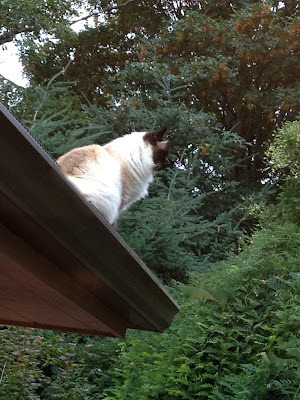 I give away my position in the kitchen:
I give away my position in the kitchen:
 At which point he magically appears overhanging the kitchen door yelling: Feed me! I've been on guard all morning!
At which point he magically appears overhanging the kitchen door yelling: Feed me! I've been on guard all morning!
 And, being well-trained by previous cats, I obey and produce a tiny platter of ground beef. To which he responds, What the fuck is that?
And, being well-trained by previous cats, I obey and produce a tiny platter of ground beef. To which he responds, What the fuck is that?
 And gives me a wounded look (not included) and leaves, abandoning the offering. No doubt as I'm typing this some crow is taking advantage.
And gives me a wounded look (not included) and leaves, abandoning the offering. No doubt as I'm typing this some crow is taking advantage.
I feel spurned. Sniff.
 I give away my position in the kitchen:
I give away my position in the kitchen: At which point he magically appears overhanging the kitchen door yelling: Feed me! I've been on guard all morning!
At which point he magically appears overhanging the kitchen door yelling: Feed me! I've been on guard all morning! And, being well-trained by previous cats, I obey and produce a tiny platter of ground beef. To which he responds, What the fuck is that?
And, being well-trained by previous cats, I obey and produce a tiny platter of ground beef. To which he responds, What the fuck is that? And gives me a wounded look (not included) and leaves, abandoning the offering. No doubt as I'm typing this some crow is taking advantage.
And gives me a wounded look (not included) and leaves, abandoning the offering. No doubt as I'm typing this some crow is taking advantage.I feel spurned. Sniff.
Published on September 09, 2012 09:03
September 8, 2012
Slanting shadow and burning sun
It's been hot here in Seattle--unusually so for this time of year. Ninety degrees after Labor Day...
It makes the days feel like a gift, and slightly unreal: the sun is burning hot, yes, but the shadows have the slant of early fall, and spiders are beginning to spin their webs.
Perhaps it doesn't help that I'm about to dive deep into an editorial revision of Hild, work I love but that effectively removes me from the twenty-first century. I love wandering about in the seventh-century: the colours, the smells (yeah, I mean smell not scent), the noise, the wind and waves and woods... When other people try to talk to me I smile gently and nod but I've honestly no clue what they're talking about, and after a while they go away.
Which is my way of saying I might not be around a lot in the next couple of days but that I'll be happy, and working, and I hope that where/whenever you are delights you too.
It makes the days feel like a gift, and slightly unreal: the sun is burning hot, yes, but the shadows have the slant of early fall, and spiders are beginning to spin their webs.
Perhaps it doesn't help that I'm about to dive deep into an editorial revision of Hild, work I love but that effectively removes me from the twenty-first century. I love wandering about in the seventh-century: the colours, the smells (yeah, I mean smell not scent), the noise, the wind and waves and woods... When other people try to talk to me I smile gently and nod but I've honestly no clue what they're talking about, and after a while they go away.
Which is my way of saying I might not be around a lot in the next couple of days but that I'll be happy, and working, and I hope that where/whenever you are delights you too.
Published on September 08, 2012 09:41
September 7, 2012
Kindle Paperwhite
Yesterday was a busy one for publishing news. It would burst my brain to tell you all of it in detail, so I'll stick to the briefest outline, with a brief look at one service followed by a more in-depth focus on one device.
Amazon made a series of announcements yesterday about media-consuming hardware and services that will, yet again, change the way many of us read. (If you want all the details, watch the video embedded at the end of this post. Or read articles here and here.)
What I want to take a brief look at is one of the services announced: Kindle Serials. This is a book sent to your device in installments, as it's released, automatically. The cool part is that you only pay once, upfront. (Current introductory price $1.99.) And then the installments just show up on your device, added seamlessly to what you have. So only have to read, with no thinking beyond that initial purchase decision.
I think this might be a game-changer--though I suspect it could take a while to catch on, not unlike digital downloads of audio books.
But what I really want to focus on is one of the new devices: the Kindle Paperwhite. I want one. It costs $119 and ships on October 1. It's called Paperwhite because a) the whites are whiter and the blacks are blackers and b) it is front lit. You can read it in the dark, but without glare, because the light is beamed down onto the text, not up at your eyes. In other words, you see the text the way you would see it in a paper book in bright sunlight. And no glare. Oh, also that light is supremely adjustable, so you can read it at night when your sweetie is asleep. And--and this is really fab--you can get eight weeks of battery life with that light on all the time.
Below are a few screenshots from the video presentation. With the Paperwhite you can not only resize the font, you can choose what it looks like:
 Here's a nice drop-cap, in Palatino.
Here's a nice drop-cap, in Palatino.
 Using the X-Ray feature, you can call up a schematic of the various characters in the book, showing when they appear:
Using the X-Ray feature, you can call up a schematic of the various characters in the book, showing when they appear:
 Then you can go deeper into one of those characters:
Then you can go deeper into one of those characters:

You can look at the author bio, which, thrillingly, lists their bibliography. Each book is just one click--sixty seconds--away:
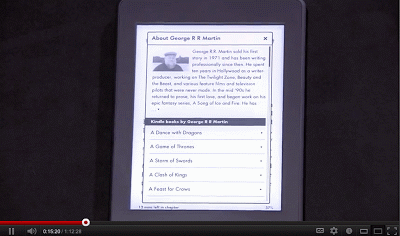
Speaking as a writer, this is going to rock my world: when a reader enjoys, say, The Blue Place, she can move seamlessly to Stay (and, hopefully, Always). This will make for happier readers and slightly more healthy royalty cheques for writers. The size of these cheques will be interesting, though, because yesterday a judge (just as Bezos was about to begin the presentation) approved the e-book price-fixing settlement proposed by the Department of Justice and three of the five Big Six U.S. publishers being sued for collusion and price-fixing. Two other Big Six publishers are going to court next June. One isn't involved at all. All my novels are published by Big Six publishers: Random House (Stay, Ammonite, Slow River), HarperCollins (The Blue Place), Penguin (Always), and Macmillan (Hild). But those publishers are all in slightly different place with the lawsuit. Different pricing rules will apply to my various novels. So I await price changes with interest.
As a bonus, here's a screenshot of recent Kindle best-sellers. One of these authors is a Sterling Editing client, so that was a rush:

And here's Bezos's presentation:

Amazon made a series of announcements yesterday about media-consuming hardware and services that will, yet again, change the way many of us read. (If you want all the details, watch the video embedded at the end of this post. Or read articles here and here.)
What I want to take a brief look at is one of the services announced: Kindle Serials. This is a book sent to your device in installments, as it's released, automatically. The cool part is that you only pay once, upfront. (Current introductory price $1.99.) And then the installments just show up on your device, added seamlessly to what you have. So only have to read, with no thinking beyond that initial purchase decision.
I think this might be a game-changer--though I suspect it could take a while to catch on, not unlike digital downloads of audio books.
But what I really want to focus on is one of the new devices: the Kindle Paperwhite. I want one. It costs $119 and ships on October 1. It's called Paperwhite because a) the whites are whiter and the blacks are blackers and b) it is front lit. You can read it in the dark, but without glare, because the light is beamed down onto the text, not up at your eyes. In other words, you see the text the way you would see it in a paper book in bright sunlight. And no glare. Oh, also that light is supremely adjustable, so you can read it at night when your sweetie is asleep. And--and this is really fab--you can get eight weeks of battery life with that light on all the time.
Below are a few screenshots from the video presentation. With the Paperwhite you can not only resize the font, you can choose what it looks like:
 Here's a nice drop-cap, in Palatino.
Here's a nice drop-cap, in Palatino. Using the X-Ray feature, you can call up a schematic of the various characters in the book, showing when they appear:
Using the X-Ray feature, you can call up a schematic of the various characters in the book, showing when they appear: Then you can go deeper into one of those characters:
Then you can go deeper into one of those characters:
You can look at the author bio, which, thrillingly, lists their bibliography. Each book is just one click--sixty seconds--away:

Speaking as a writer, this is going to rock my world: when a reader enjoys, say, The Blue Place, she can move seamlessly to Stay (and, hopefully, Always). This will make for happier readers and slightly more healthy royalty cheques for writers. The size of these cheques will be interesting, though, because yesterday a judge (just as Bezos was about to begin the presentation) approved the e-book price-fixing settlement proposed by the Department of Justice and three of the five Big Six U.S. publishers being sued for collusion and price-fixing. Two other Big Six publishers are going to court next June. One isn't involved at all. All my novels are published by Big Six publishers: Random House (Stay, Ammonite, Slow River), HarperCollins (The Blue Place), Penguin (Always), and Macmillan (Hild). But those publishers are all in slightly different place with the lawsuit. Different pricing rules will apply to my various novels. So I await price changes with interest.
As a bonus, here's a screenshot of recent Kindle best-sellers. One of these authors is a Sterling Editing client, so that was a rush:

And here's Bezos's presentation:
Published on September 07, 2012 12:32
September 6, 2012
You like?
From: Pia
You like?
Yes. I'm guessing that's a tenor ukulele, a wee bit bigger than mine--though something of the same tone (if, y'know, I could actually play it). Thanks for that.
I will get back to practicing and improving my meagre skills.
Published on September 06, 2012 09:29
September 5, 2012
In which I play the ukulele
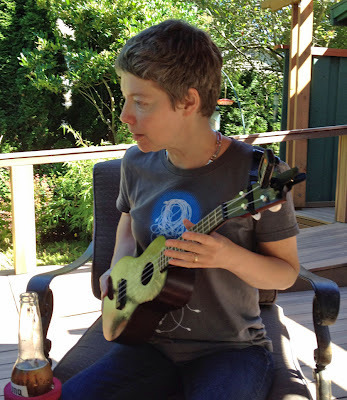 slinging on the old uke to show it to Kelley's folksI've had my ukulele exactly one week. I've just recorded my first attempt at a song. Because I'm an awkward bastard, I chose a song I've never sung before and don't really know--though it has many associations.
slinging on the old uke to show it to Kelley's folksI've had my ukulele exactly one week. I've just recorded my first attempt at a song. Because I'm an awkward bastard, I chose a song I've never sung before and don't really know--though it has many associations.I've always been able to sing okay--though currently I'm really out of practise. And for someone who's been playing the ukulele only one week I think it's possible I'll end up being able to play in a way that won't wholly embarrass everyone around me.* But I'm less sanguine about being able to do both at the same time. If you want a demonstration of this, here's a 55-sec snippet of me trying to play the first verse of "Hallelujah." (You might need to turn it up because I wasn't exactly belting it out.) Recorded on my iPhone** immediately after breakfast and uploaded for public consumption twenty minutes ago before the caffeine hits my system and I recover my senses.
Enjoy.
* Not because I'm a musical savant [snort] but because the ukulele is astonishingly beginner-friendly. It invites playful engagement in a way that, say, a violin doesn't. I mean, really, after George Formby who can take a ukulele seriously? They're a purely fun-based lifeform.
** Using the Voice Memo app, which is fantastically simple. A practically perfect little thing. And, again, it discourages Taking Oneself Seriously, something I've spent entirely too much of life doing.
*** Uploaded to via a nifty service called Chirbit.
Published on September 05, 2012 11:16
September 4, 2012
Nineteen years ago today
I married Kelley nineteen years ago today. She married me, too, of course. More precisely, we married each other--really: no one officiated.
We spoke our vows to each other; one of the things we promised was to be "strong and brave and fierce" for each other. We read excerpts from the letters we exchanged during the fifteen months we spent separated by the Atlantic ocean in the days before email. Then family and friends stood up one by one and spoke of their hopes for us and our marriage.
It was a beautiful day. We are only part of the way through our beautiful life. It is very, very good.
At some point in the future, it will be possible to marry in the eyes of the law, not just our family and friends. And I promise you: on the day Kelley and I make this legal on a federal level, we will have a party that makes the London 2012 Olympic Closing Ceremonies look like a four year-old's finger-painting party.
Meanwhile, here's a selection of pictures from the last 24 years. Our hairstyles change but our hearts don't.
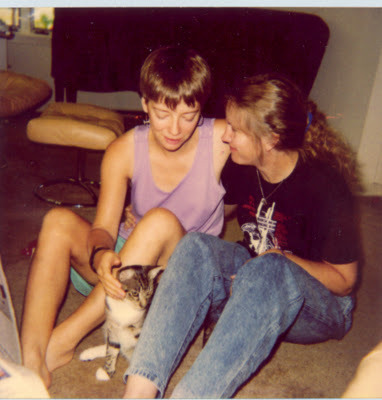 August 1989
August 1989
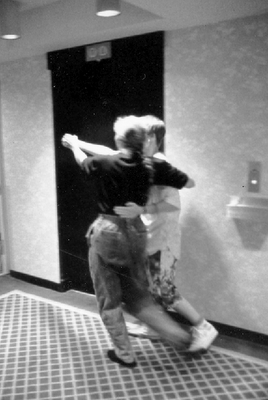 September 1989
September 1989
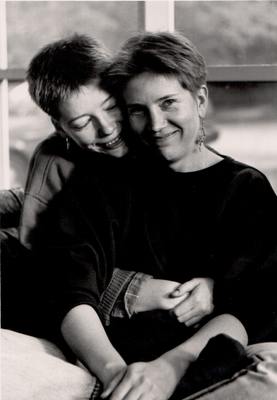 October 1992
October 1992
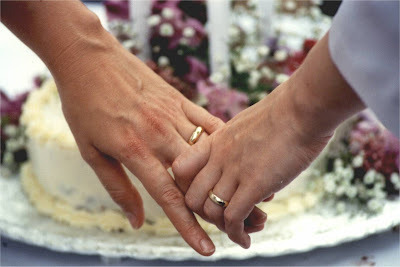 September 1993
September 1993
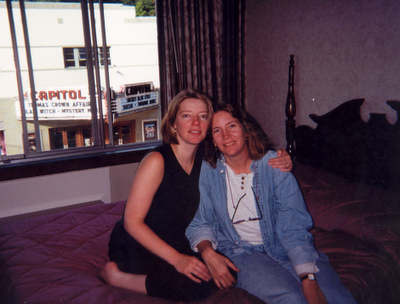 Summer 1999
Summer 1999
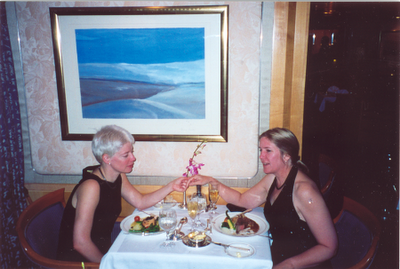 September 2000
September 2000
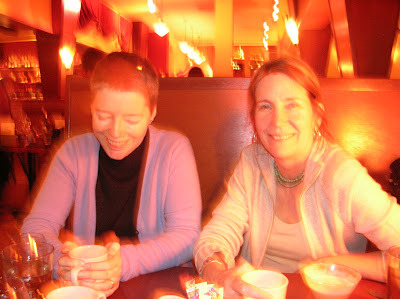 March 2007
March 2007

We spoke our vows to each other; one of the things we promised was to be "strong and brave and fierce" for each other. We read excerpts from the letters we exchanged during the fifteen months we spent separated by the Atlantic ocean in the days before email. Then family and friends stood up one by one and spoke of their hopes for us and our marriage.
It was a beautiful day. We are only part of the way through our beautiful life. It is very, very good.
At some point in the future, it will be possible to marry in the eyes of the law, not just our family and friends. And I promise you: on the day Kelley and I make this legal on a federal level, we will have a party that makes the London 2012 Olympic Closing Ceremonies look like a four year-old's finger-painting party.
Meanwhile, here's a selection of pictures from the last 24 years. Our hairstyles change but our hearts don't.
 August 1989
August 1989
 September 1989
September 1989
 October 1992
October 1992
 September 1993
September 1993
 Summer 1999
Summer 1999
 September 2000
September 2000 March 2007
March 2007
Published on September 04, 2012 11:34
September 3, 2012
I need some Hild help: anyone know Old Irish?
In terms of writing fiction, Irish has been the bane of my life. It's my own fault; I'm lazy--or perhaps impatient is a better word--when in the grip of the work.
Twenty years ago, when I was writing Ammonite , I created an isolated tribe based on the Mongols. I was hot on the trail of the story, and used placeholder proper nouns based on Gaelic vocabulary. I meant to do the necessary research later and swap out the placeholders for the real words.
But here's the thing about fiction. It doesn't always work according to plan. The characters took on the attributes of their names. I couldn't change the Echraidhe to, say, the Buriyads, or Uaithne for, oh I don't know, Miroslava. It was too late.
Reading through Hild again, I've discovered I'm about to commit the same mistake. Early on in the book, when Hild is about ten, she encounters an old and damaged Irishman who speaks very little Anglisc (Old English). In a cursory online search I couldn't find the Old Irish I needed so I scooped up a hodge-podge of Irish words of dubious provenance, plunked them down, and surged on.
Here's how that passage reads:
In return I can promise my thanks--and an acknowledgement in the final copy (whether or not the passage above is cut or not).
Twenty years ago, when I was writing Ammonite , I created an isolated tribe based on the Mongols. I was hot on the trail of the story, and used placeholder proper nouns based on Gaelic vocabulary. I meant to do the necessary research later and swap out the placeholders for the real words.
But here's the thing about fiction. It doesn't always work according to plan. The characters took on the attributes of their names. I couldn't change the Echraidhe to, say, the Buriyads, or Uaithne for, oh I don't know, Miroslava. It was too late.
Reading through Hild again, I've discovered I'm about to commit the same mistake. Early on in the book, when Hild is about ten, she encounters an old and damaged Irishman who speaks very little Anglisc (Old English). In a cursory online search I couldn't find the Old Irish I needed so I scooped up a hodge-podge of Irish words of dubious provenance, plunked them down, and surged on.
Here's how that passage reads:
The water slapped, the canes rattled, and man, girl, and dog all looked at the sky--clouds piling together, no longer tin but lead--then each other. Hild, encouraged, stood, came closer--oh, her shoes were more mudcake than leather now--and pointed at the willow man, at his white crinkly hair, and said one of the Irish words she knew, "Bán."
And he laughed toothlessly, then loosed a torrent of Irish at her. His accent was strange. She understood three words of it, cailín, maid, Sasanach, Anglisc, and ocrach, hungry, and shook her head. "Go mall," she said, slowly, and "le do thoil," please, and he said it all again. "Go mall," she said again, "lo do thoil." And Madra tilted his head and whined, and then Bán spoke one more time in a jumbled Anglisc/British/Irish mix, and Hild listened with her whole skin, the way she listened to rooks in the field or wind in the trees. She understood, she thought. He was asking her if she was hungry.
She sat in the mud--Onnen would scold her raw--offered a fist to Madra, the first dog she had allowed near her since she watched Od eat the guts of Osric's man, and repeated back to Bán as well as she could, with the words he had used, that she, the Anglisc maid, whose name was Hild, was hungry, a little, but that when she returned she would be very well provided for. And he nodded, but shook his fingers dismissively in that Irish way, just like Fursey, and tutted, and unfastened the sack at his waist and offered her half his cheese and a bite of onion, and a dip in the coarse grey salt collected in the seam of his sack.So now I'm throwing myself on the mercy of the internets. Do you know Old Irish? Will you check/correct this for me? Or point me to a decent Old Irish glossary/phrase list?
In return I can promise my thanks--and an acknowledgement in the final copy (whether or not the passage above is cut or not).
Published on September 03, 2012 13:27
September 1, 2012
Just for a little while
I get asked to do a lot of things for free or Just Because: to help new writers, to write blurbs for new books, to write a letter of recommendation, to send something to auction for a good cause, to comment on an idea, to sharpen a job-seeking friend's resume, to visit a library or college. The list is endless (this is not hyperbole). And I'm not special in this way: it happens to lots of writers. But partly because of the way I was brought up, partly because of the genre in which I first got my start, and partly because much of this is genuinely a pleasure, I often say Yes.
Now, just for a little while, the answer is switching to No*.
So, just for a little while, I will not contribute to your fun web article. I will not write an essay for your periodical. I will not review your book. I will not be interviewed. I will not take part in a podcast roundtable. I will not join your board. I will not brainstorm or join your working group. I will not read for or judge your award. I will not run your non-profit social media campaign. I will not give you pointers on your online presence. I will not RT your good cause or recruit for your fundraiser. I will not agree to meet you for the first time no matter what country you have travelled from for the purpose.
As I've said, I actively enjoy many of these things (particularly meeting readers, visiting colleges, being able to recommend students for things, and reading really splendid ARCs of new books whether for blurbs or reviews).
But, just for a little while, I am going to focus wholly on me, Kelley, and our stuff (severally and collectively). The Hild rewrite is imminent. After that I'll be turning my attention to Hild II--and to three other projects (not all of them writing related). Also, I need to pay some serious attention to health maintenance, not to mention family and friends.
I'm not going to vanish. I'll still be here blogging and tweeting. Indeed, it's entirely possible I'll get back to blogging more regularly. I just need to stop spreading myself so thin. Just for a little while.
---
* Unless it's the kind of thing that involves an enforceable contract and monetary reward. Because, hey, I'm only human.
Now, just for a little while, the answer is switching to No*.
So, just for a little while, I will not contribute to your fun web article. I will not write an essay for your periodical. I will not review your book. I will not be interviewed. I will not take part in a podcast roundtable. I will not join your board. I will not brainstorm or join your working group. I will not read for or judge your award. I will not run your non-profit social media campaign. I will not give you pointers on your online presence. I will not RT your good cause or recruit for your fundraiser. I will not agree to meet you for the first time no matter what country you have travelled from for the purpose.
As I've said, I actively enjoy many of these things (particularly meeting readers, visiting colleges, being able to recommend students for things, and reading really splendid ARCs of new books whether for blurbs or reviews).
But, just for a little while, I am going to focus wholly on me, Kelley, and our stuff (severally and collectively). The Hild rewrite is imminent. After that I'll be turning my attention to Hild II--and to three other projects (not all of them writing related). Also, I need to pay some serious attention to health maintenance, not to mention family and friends.
I'm not going to vanish. I'll still be here blogging and tweeting. Indeed, it's entirely possible I'll get back to blogging more regularly. I just need to stop spreading myself so thin. Just for a little while.
---
* Unless it's the kind of thing that involves an enforceable contract and monetary reward. Because, hey, I'm only human.
Published on September 01, 2012 08:33
August 31, 2012
RIP Shulamith Firestone
I've just found out that Shulamith Firestone, feminist, radical, and author, died on Tuesday.
Her The Dialectic of Sex: The case for feminist revolution (Morrow, 1970) was the first explicitly feminist book I ever read. I read a battered library copy. It was chewy stuff. I was nineteen. Her basic thesis was that if women didn't have to bear children, we could eventually dismantle the oppressive patriarchal apparatus and attain true equality.
Here (lifted from Firestone's Wikipedia entry) is a fairly representative quote:
What I didn't like was the separation of mind and body. On some level I've always believed that if we all--women and men--just loved our bodies more, not less, if we valued our organic and visceral selves, our overlaps and differences, rather than despairing over or disliking same, we would all be better off. We are our bodies. The more divorced we become from them, the more alien we become to ourselves and each other.
But that book was a mind-opener to me, the crack that let the light in.
Her The Dialectic of Sex: The case for feminist revolution (Morrow, 1970) was the first explicitly feminist book I ever read. I read a battered library copy. It was chewy stuff. I was nineteen. Her basic thesis was that if women didn't have to bear children, we could eventually dismantle the oppressive patriarchal apparatus and attain true equality.
Here (lifted from Firestone's Wikipedia entry) is a fairly representative quote:
So that just as to assure elimination of economic classes requires the revolt of the underclass (the proletariat) and, in a temporary dictatorship, their seizure of the means of production, so to assure the elimination of sexual classes requires the revolt of the underclass (women) and the seizure of control of reproduction: not only the full restoration to women of ownership of their own bodies, but also their (temporary) seizure of control of human fertility - the new population biology as well as all the social institutions of child-bearing and child-rearing. And just as the end goal of socialist revolution was not only the elimination of the economic class privilege but of the economic class distinction itself, so the end goal of feminist revolution must be, unlike that of the first feminist movement, not just the elimination of male privilege but of the sex distinction itself: genital differences between human beings would no longer matter culturally. (A reversion to an unobstructed pansexuality Freud's 'polymorphous perversity' - would probably supersede hetero/homo/bi-sexuality.) The reproduction of the species by one sex for the benefit of both would be replaced by (at least the option of) artificial reproduction: children would born to both sexes equally, or independently of. either, however one chooses to look at it; the dependence of the child on the mother (and vice versa) would give way to a greatly shortened dependence on a small group of others in general, and any remaining inferiority to adults in physical strength would be compensated for culturally. The division of labour would be ended by the elimination of labour altogether (through cybernetics). The tyranny of the biological family would be broken.If I remember correctly Firestone imagined artificial wombs. This vision influenced a lot of feminist science fiction. It influenced me--because it made me think. It made me work out what I didn't like about her vision.
—Shulamith Firestone, The Dialectic of Sex
What I didn't like was the separation of mind and body. On some level I've always believed that if we all--women and men--just loved our bodies more, not less, if we valued our organic and visceral selves, our overlaps and differences, rather than despairing over or disliking same, we would all be better off. We are our bodies. The more divorced we become from them, the more alien we become to ourselves and each other.
But that book was a mind-opener to me, the crack that let the light in.
Published on August 31, 2012 11:13
August 29, 2012
Jeepster
I have a new toy:
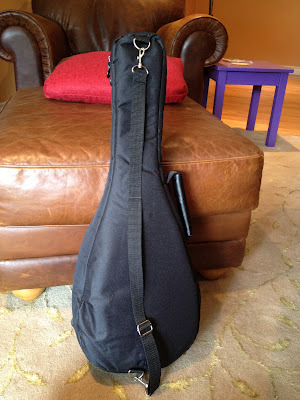
A ukelele made by a friend, Karina. And, trust me, it was a complete surprise. (Though apparently Kelley was in on the plot.)
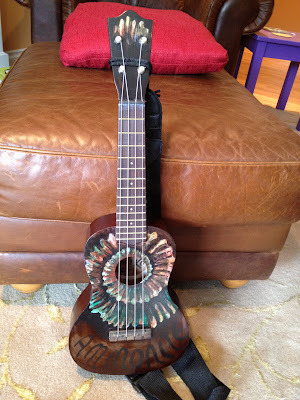
But it's a very happy surprise. I had no idea I was yearning to get back to music until I tried this out. I'm calling it Jeepster, because of its decoration (also by the multi-talented Karina).
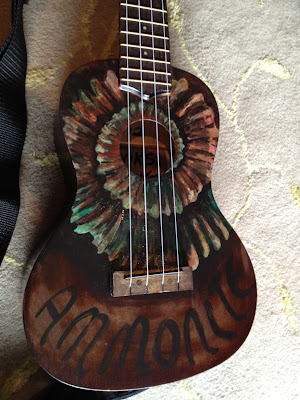
I suspect that over the next months I will drive those I love, plus a few neighbours, batshit crazy with my amateur plinking. After ten minutes with it, I know it's going to be a lot easier to play than a guitar. So maybe it won't be too long before I'm driving you all crazy with it, too, bringing YouTube to its knees...
Anyone out there have any notion of how the music of Jeep might sound?

A ukelele made by a friend, Karina. And, trust me, it was a complete surprise. (Though apparently Kelley was in on the plot.)

But it's a very happy surprise. I had no idea I was yearning to get back to music until I tried this out. I'm calling it Jeepster, because of its decoration (also by the multi-talented Karina).

I suspect that over the next months I will drive those I love, plus a few neighbours, batshit crazy with my amateur plinking. After ten minutes with it, I know it's going to be a lot easier to play than a guitar. So maybe it won't be too long before I'm driving you all crazy with it, too, bringing YouTube to its knees...
Anyone out there have any notion of how the music of Jeep might sound?
Published on August 29, 2012 10:25



